The short life expectancy of modern comedians
It’s tough to be funny in the 21st Century. Doesn’t it seem that almost every big movie comedian of the last ten years becomes either annoying or keeps playing the same character way too quickly? I challenge you to find a prolific comedian with an immaculate record, especially north of the year 2000.
Funny people heat up so quickly and cool off even faster these days; Hollywood shoves them right through the ringer. If they’re not starring in something immediately after their breakout hit, they’re given a cameo or supporting role. Everyone who’s ever made a Judd Apatow-produced movie belongs to this fraternity of comedians that shuffles around to give a different member the lead for each successive film. Actors fall into ruts so fast that even though no one makes comedy sequels almost ever these days, it feels like that’s exactly what they’ve been doing — and for years.
So let’s take a look at some of those names and see if we can figure out why these once-fresh acts turn so quickly stale — and what they can do about it.
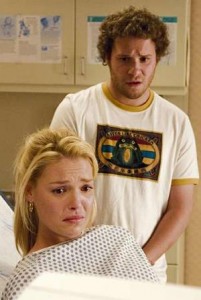 Two great examples star in films hitting theaters this weekend. One is Seth Rogen (“The Green Hornet”) and the other Vince Vaughn (“The Dilemma”). Each actor has one clear breakout role, two or three other well-received films and then a short slew of unpopular or berated junk.
Two great examples star in films hitting theaters this weekend. One is Seth Rogen (“The Green Hornet”) and the other Vince Vaughn (“The Dilemma”). Each actor has one clear breakout role, two or three other well-received films and then a short slew of unpopular or berated junk.
Rogen hit the movie scene with his first big supporting role in “The 40-Year-Old Virgin” as the shady electronics repair guy, Cal. His breakout film was the extremely well-praised “Knocked Up” in 2007, just three and half years ago. He followed that up as a dumb cop in the equally hilarious “Superbad” and had a strong 2008 starting with some voice acting and then later on in stoner comedy “Pineapple Express” and Kevin Smith’s “Zack and Miri Make a Porno” (not as universally loved as the 2007 films, but both very enjoyable).
Then came 2009’s off-color “Observe and Report” that starred Rogen as a bi-polar mall cop — mostly awful. That summer he starred for Judd Apatow again with Adam Sandler in “Funny People” as an aspiring comic — luke-warm responses. 2010 was a below-radar year for the actor, but 2011 puts his humor front and center right away in “The Green Hornet.” How will he be received?
Vaughn underwent a career renaissance as a comedian, though he was known for starring in “Swingers” and appearing in “The Lost World: Jurassic Park” and the loathed Gus Van Sant remake of “Psycho.” He resurfaced with a supporting role in “Old School” in 2003 with Will Ferrell and Luke Wilson and then became a household name after the trio of “Dodgeball,” “Anchorman” and specifically “Wedding Crashers,” a film that got him in with the 40+ audience.
Then came the mixed-to-poor reception for the 2006 teaming with Jennifer Aniston in “The Break-Up,” the frustrating “Fred Claus” (2007) and in the following couple years, the critically ripped “Four Christmases” (2008) and “Couples Retreat” (2009). Directed by Ron Howard and paired now with Adam Sandler regular Kevin James, Vaughn looks to have a similar fish in “The Dilemma.”
The same trend of two incredible years followed by as many as three bad ones can be found with most comedians, (especially Will Ferrell), but the problem is never so much the actor but the failure to change the context around him/her.
With exception of “Fred Claus,” all of Vaughn’s comedies since “The Break-Up” have been geared to couples in the 30-60 year-old age range. Vaughn is a master of rants, insults and making everyone around him seem crazier than he is. But if he’s constantly ranting about wives or girlfriends and typical “guy” stuff because he’s only playing that kind of part, then he’s never going to resurface.
That’s why I’m optimistic for Rogen, if nothing else, to come out of “Hornet” with his reputation in check. There’s no doubt “The Green Hornet” has been injected with his and friend/collaborator Evan Goldberg’s humor, maybe even excessively at times. It also appears as if he’s going to play someone stupid. However, the dynamic with someone like Taiwanese star Jay Chou will be totally different; he won’t be with his usual Apatow cronies and the superhero trappings will be a total change of pace. He also lost a lot of weight for the part, which bares relevancy only because part of his shtick was being physically revolting.
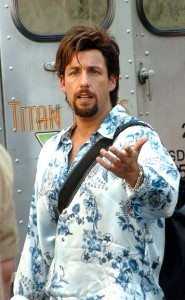 Other famous comedians have had to adapt over time. Adam Sandler (Rogen’s “Funny People” co-star) has been making reputable comedies for 15 years now. He didn’t go without his string of derided films (“Little Nicky,” “Mr. Deeds” and “Eight Crazy Nights” to name a few) either, but he’s taken some big leaps to keep himself fresh in the public eye. Consider the drastic change for “You Don’t Mess with the Zohan,” one of his few recent films I really enjoyed, that had him bulk up to play an Israeli agent turned hair stylist. Sandler has also painted himself into more age-appropriate roles. Instead of the idiot immature guy he’s the non-traditional dad or distasteful bachelor. The change didn’t revolutionize him, but it allowed for his continued success financially at least and kept him in good standing with his also-aging fans.
Other famous comedians have had to adapt over time. Adam Sandler (Rogen’s “Funny People” co-star) has been making reputable comedies for 15 years now. He didn’t go without his string of derided films (“Little Nicky,” “Mr. Deeds” and “Eight Crazy Nights” to name a few) either, but he’s taken some big leaps to keep himself fresh in the public eye. Consider the drastic change for “You Don’t Mess with the Zohan,” one of his few recent films I really enjoyed, that had him bulk up to play an Israeli agent turned hair stylist. Sandler has also painted himself into more age-appropriate roles. Instead of the idiot immature guy he’s the non-traditional dad or distasteful bachelor. The change didn’t revolutionize him, but it allowed for his continued success financially at least and kept him in good standing with his also-aging fans.
All great comedians have the highest of highs and lowest of lows throughout their career. Some leave the comedy gig altogether (Bill Murray) while others try totally out-there stuff (such as Eddie Murphy’s prosthetics binge and Steve Martin’s “Pink Panther” failures). Chevy Chase has just recently found a new fit on NBC’s “Community” after essentially a 10-year absence from the public eye.
No one stays consistently funny forever, but it’s the great ones that adapt and rediscover the magic as times change because no genre remains as in flux as comedy. What’s in now will be out in two years, maybe a year and a half. But because comedies can be scraped together, popular actors like to crank them out while the coals are still hot. Decisions on upcoming projects are made without thinking about the future or being ahead of the curve. It’s “how can I capitalize on my last hit movie now,” not “what’s the next great funny thing I can wow people with in two years.” Money factors into this thought process I’m sure — such is the nature of the beast.
But today’s burgeoning comedians must answer those questions faster than anyone before them ever had to. Exposure is at an all-time high: people can consume mass amounts of movies, television and random YouTube clips at will. They’re following the Twitter feed of that cool actor on that obscure new cult-favorite show and reading fan blogs about that person in between episodes. If you’re only a one, two or three-tool actor, you’re going to go stale fast. Or if you don’t go stale because you’re really good, someone’s going to find the next great funny person who does what you do. Maybe that person will even be discovered on YouTube.
Comedic actors or filmmakers aren’t less funny than the guys of the ’70s. I’m not going to make that argument — humor has evolved too much to make a fair comparison. What I can say, is that people who make a living off funny need to be forward-thinking today and no one really does it. Judd Apatow did during the middle chunk of the last decade whipping up R-rated comedies — every new movie was a hit and launched someone’s career like Rogen or Steve Carell. The key is figuring out how to make what you do appear fresh again.
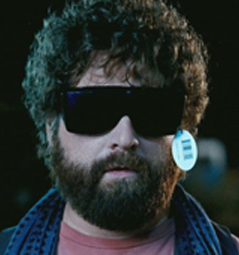 Certainly some eternal truths exist about what makes a movie funny or an actor funny. Shakespeare is just as funny now as back then albeit some Elizabethan pop culture is lost today. When it comes to acting funny, that core truth remains in creating characters, particularly those who surprise us. When today’s popular actors broke onto the scene, we thought they were hysterical because what they did was “unexpected.” When actors or filmmakers use those same tactics or don’t change who these characters are internally so that we’re just looking at actors on screen instead of creations of a story, that’s when things go rotten.
Certainly some eternal truths exist about what makes a movie funny or an actor funny. Shakespeare is just as funny now as back then albeit some Elizabethan pop culture is lost today. When it comes to acting funny, that core truth remains in creating characters, particularly those who surprise us. When today’s popular actors broke onto the scene, we thought they were hysterical because what they did was “unexpected.” When actors or filmmakers use those same tactics or don’t change who these characters are internally so that we’re just looking at actors on screen instead of creations of a story, that’s when things go rotten.
Zach Galifianakis was to die for in “The Hangover” in 2009. He didn’t change too much other than up the eccentricities for last November’s “Due Date,” which was funny, but didn’t fair quite as well with critics and moviegoers. It happens that fast.
So a comedian’s quest for a long life in the limelight is how to defy, break or exceed our expectations. Most commonly this comes in the form of stories. If an excellent story and characters are at work in a comedy, the talents will be funny. You’ll often read reviews that state “two great comedians couldn’t salvage an awful script,” but you’ll almost never read “the story was so downright hysterical — if only the actors were up to the challenge.” Movies just don’t work that way. So today’s funny people are killing themselves with complacency and comfort rather than thinking ahead and looking for a script that can work to their mutual benefit. With some patience, most comedians could have a much longer lifespan.



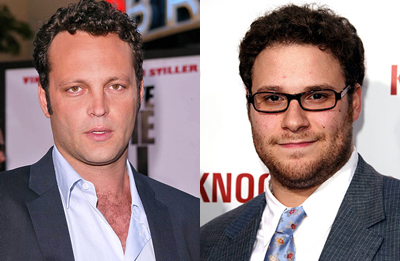
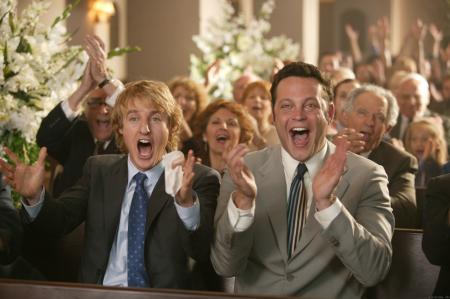

0 Comments
You can be the first one to leave a comment.